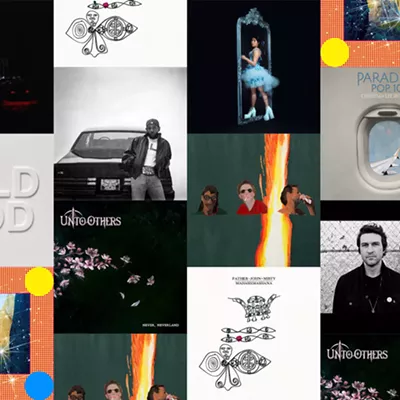Sometime in the '90s, selling out became a serious problem. Where it started is uncertain and probably unknowable, though where it has led is well understood. Though "being indie" and "selling out" are opposite ends of a very bitchy spectrum, they are by no means self-sustaining. Indie, the term, can be roughly traced to Britain in the '80s. Indie, the ethos of making music regardless of popularity, has existed, if you can believe it, before even records themselves.
There was a time in America, though, when, a group of people needed to define themselves by what they weren't. This group decided indie should mean everything not attached to a major label record deal. The sentiment existed in the '80s, when punk bands like the Dead Kennedys made a point of distancing themselves from yuppiedom, but it remained fringe, the majority of hip kids still listening to Bon Jovi, Michael Jackson and Tiffany. Maybe because most of the world had decided the cocaine and Dow Jones excess of the '80s had been misguided, or because it was impossible to get a decent flannel at ShopKo (or perhaps just because Ethan Hawke said so), a big chunk of American youth culture in the '90s coalesced around being decidedly non-corporate. A section, what would become known as grunge, got popular and almost immediately went corporate. This created a wave of righteous indignation and a love/hate dynamic between bands like Nirvana and their fans. This lasted for a long time, like 10 years or something.
As has happened throughout eternity, though, small bands have continued to get popular and continued to sell out. And somewhere along the line, the epithet weakened to the point it's begun to no longer matter.
Here's what I think happened. The Internet has changed us, allowing things that were formerly unthinkable (I totally taught my mom to shop for shoes online last month). Of greatest importance for music commerce is the ability to create social networks of people and bands such that a single webpage can do all the marketing work of record labels.
This means that, while indie had cachet before, it now has a demonstrable market share. Not a huge share, but neither does Keb' Mo', and that dude's signed to Sony. As a result, major labels are increasingly OK with dropping an album that will cater to a band's fans, so long as those fans have MySpace pages. Couple this with the ubiquity of indie prestige on shows like The OC and Grey's Anatomy (earlier on shows like HBO's cutting edge Six Feet Under) and the necessary inclusion of a twee pop collective on any commercial peddling cars to aging hipsters and we're again seeing a fusion of art and commerce the hip kids haven't condoned for years.
It wasn't so long ago that Modest Mouse signed to a major label, had 2004's jam of the summer ("Float On" a song antithetical to the band's perceived ethos), and were berated widely as sellouts. In 2006, the Decemberists have released their major label debut, The Crane Wife, and played The Colbert Report, becoming the toast of a very strange demographic, gaining traction as much on YouTube as on MySpace.
Like Modest Mouse, though, the Decemberists wrote a very summer friendly song ("Summersong") for the release. People aren't clamoring for their heads because "Summersong" will never be a hit. Capitol isn't even marketing it as a single. Somewhere between'04 and '06, the industry realized there's a more cost-effective way to sell niche records than trying to hamstring singles down a million tweens' throats. There's a boutique market for the Decemberists, and it's good-sized, so long as the label lets people know about it in creative ways like getting fans to make Meloy and Stephen Colbert fight with lightsabers. It's still shameless promotion, but it feels less jarring because we won't have to listen to "Summersong" on ZZU all summer. The music is going major, but remaining recognizable.
People are OK with that. All anyone ever wanted was for the band they identified with to keep their identity. Record companies are OK with that. Identification is the essence of branding.
Commerce is becoming more diverse and specialized. Labels needed to recognize that and they did. So by deign of the surprising marketing coups pulled by teenagers milking the nascent Internet 2.0, big music is returning to the principles that made it big in the first place.
Before we go congratulating them for giving us what we want, though, understand this: they didn't have a choice. They can't any longer expect us to buy the Decemberists with Justin Timberlake with Clipse with Evanescence, so they're changing for the more consumer-friendly. For better or worse, that will kill the clamor from the cheap seats.
LUKE'S TOP TEN CDs OF 2006
10) Destroyer, Destroyer's Rubies
I can tell it's brilliant because it's hard to listen to, yet I keep trying.
9) Night Ripper, Girl Talk
Anyone who can mash up Black Eyed Peas' "My Humps" and Styx' "Come Sail Away" -- and thus validate, in an artistic context, two bands I despise -- deserves our admiration.
8) Clipse, Hell Hath No Fury
7) TV On The Radio, Return to Cookie Mountain
6) Hold Steady, Boys and Girls in America
5) Sunset Rubdown, Shut Up I am Dreaming
4) Islands, Return to the Sea
I listened to this Graceland-inspired offshoot of the Unicorns more than any other record this year.
3) Lily Allen, Alright Still
An album made up of material from '05, popularized in '06, will still be talked about in '07. This is MySpace's first real coup, and it's a brilliant debut.
2) Ghostface, Fishscale
1) Danielson, Ships
From the noun to the suffix, an exploration of all the meanings four letters can have. This one had me giddy almost all year.
















